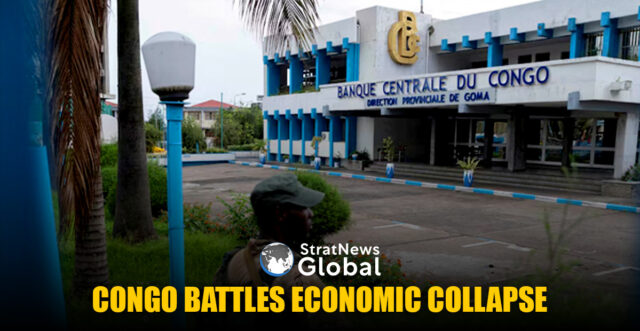The M23 rebels, who defeated Congo’s army to seize control of the eastern region, now face the challenging and routine task of governing.
The long-term success of their uprising – which aims to overthrow the current leadership in the capital of Kinshasa – requires showing they can bring order and prosperity to the regions they already hold.
Whether they can pull it off depends in large part on reviving the economy in seized areas that are home to more than five million people.
Taxes Rise Amid Chaos
Virtually all banks are closed. Currency shortages abound. With supply chains disrupted, prices of some staples have jumped. Now, residents are finding themselves subject to new taxes imposed by the insurgents, who need money to finance their revolution.
The changes can be seen near the town of Rubaya, where M23 has moved quickly to tighten its grip on a slice of Congo’s vast mineral wealth.
Small, artisanal mines there produce around one-sixth of the world’s supply of coltan, a metallic ore crucial to the production of smartphones and other electronic devices. M23 now charges a tax of 15% on the value of that coltan production, according to rebel officials and traders who disclosed that figure for the first time to Reuters.
High Duties
Rebel administrators are rolling out other levies too. Private businesses and aid agencies have been handed tax bills.
They’re imposing duties as high as 20% on small-time traders to sell staples like bananas, cloth and cooking charcoal, even as cash-strapped consumers tighten their belts.
“Customers don’t come any more,” said Rachelle Monimpo, who sells clothes in a Goma market. “It’s becoming very complicated for us to get the money to pay this tax.”
Reuters journalists recently visited the M23-controlled cities of Goma and Bukavu, as well as Rubaya, a town to the west, and spoke to more than three dozen officials, residents, traders and businesspeople living or operating there.
Most requested anonymity to speak freely about the latest upheaval in the years-long conflict in Congo.
Conflict Sparks Mass Displacement
The fighting has displaced more than 4 million people, involved dozens of armed groups and sucked in armies from three neighboring countries. Over the past four months, M23 made a lightning advance across eastern Congo that has sent hundreds of thousands more residents fleeing.
During the day, the streets of Goma and Bukavu bustle with motorcycle taxis and pedestrians. Many businesses are open. The cities’ border crossings with neighbouring Rwanda are booming as Congolese residents stream across to obtain cash and goods. As night falls, however, Goma and Bukavu are largely deserted, aside from rebel patrols and remnants of pro-government militia groups roaming the streets.
M23 receives backing from the government of Rwanda, according to the United Nations. In response, the United States, United Kingdom, Canada, Germany and the European Union have imposed a range of punitive measures, including cutting aid and sanctioning Rwandan officials and entities suspected of supporting the rebels.
Rwanda’s Backing
Rwanda has repeatedly denied funding, arming or training M23. But Rwanda’s ruling party, mainly headed by ethnic Tutsis, shares the same concerns as the Tutsi-dominated M23 rebels over the purported threat posed by rival Hutu groups operating in eastern Congo. Rwanda has said that it will do whatever it takes to defend itself.
Rwanda’s government spokesperson, Yolande Makolo, did not respond to questions sent for this story.
Guns alone can’t cement M23’s grip on eastern Congo indefinitely, says Zaynab Hoosen, a senior Africa analyst at Pangea-Risk, a South Africa-based consultancy. If the group fails to shore up the economy and restore essential services, she said, it “risks eroding local support and undermining its claims to legitimate governance, potentially weakening the durability of its rebellion.”
M23 officials disclosed their new coltan tax in interviews with Reuters, but did not respond to follow-up questions for this story.
(With inputs from Reuters)





